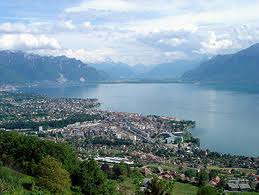In the basement of this hotel, very dark and with windows that look on a wall that supports the earth, is the laundry, where human beings work all day at washing linen. We live on top of all that, admiring fine literature, and the marvellous scenery. And today, the cloud scenery, floating above the lake and below us, was especially marvellous.
Vevey is one of the “Pearls of the Swiss Riviera”. Its lakeside location with breathtaking views of the Alpine panorama, its extraordinarily mild climate, the vineyards, numerous excursion destinations in the region and proud paddle-wheel steamers on the lake characterise this town by Lake Geneva.
 |
| http://www.myswitzerland.com/en/vevey.html |
The library I brought away with me consists of 35 volumes in all but the only books that I do mean to read are "Les Origines", "Confessions of St. Augustine", and "Le Hasard au Coin du Feu". The rest are simply brought in case I might want something. It is the surest way to avoid reading. And I should like to avoid reading for about a month. Today I began a story.
A youngish Englishman with his wife, and a boy of about ten. I saw a large red book on their table at dinner, and this intrigued me. I talked to the man after dinner. Indian Civil Service (anyhow, something in India). A brick-coloured face. Monotonous voice. Tall and thin. Takes The Times. Very cautious in his statements. Talking about India, he said the hotels were pretty bad, but not dear, and that travelling was not at all impossible. As to the administration, he said that 'we had been treating them too kindly, and they didn't understand it.' Exactly, to a word, the phrase one hears and reads in novels, etc. Still, when I said we had no moral right in India at all; that it was simple cheek on our part, he quite agreed.
He was also sympathetic towards the Indian princes and aristocracy. He said he had read in the train the whole of the previous night, except about half an hour. I began to brighten up at this and approached the book. But it was only a feeble popularisation of the court life etc. of Queen Anne. The next day he appeared with another red book - Marie Corelli's "In Holy Orders". I then gave up hope. Tonight I asked him what he thought of Morley's speech on the Indian situation.
Lord Morley was Secretary of State for India. On the occasion of the 50th. anniversary of the assumption by the Crown of the Government of India, a policy of representative institutions was outlined as an ideal to be aimed for.
He said that he had only read the summary of it. I said I had read it all. He said very cautiously, that 'they seemed to be going on the right lines'; but evidently he had large reservations to make. He talked about the mistake of regarding India as one nation, and about the difficulties caused by religion and caste. He agreed that the partition of Bengal was a mistake. He did not say what he thought of Macdonnell's speech advising the reintegration of Bengal. 'Pretty good man, Macdonnell, isn't he?' I said. He hesitated a long time and then reluctantly said 'Yes'. He said Macdonnell was very good in India, but was not liked. He surprised me by saying that Lord Curzon had a tendency in any dispute between an Englishman and a native to take the side of the native. He - it seemed to me - condemned this as one of Lord C's gravest mistakes.
No comments:
Post a Comment